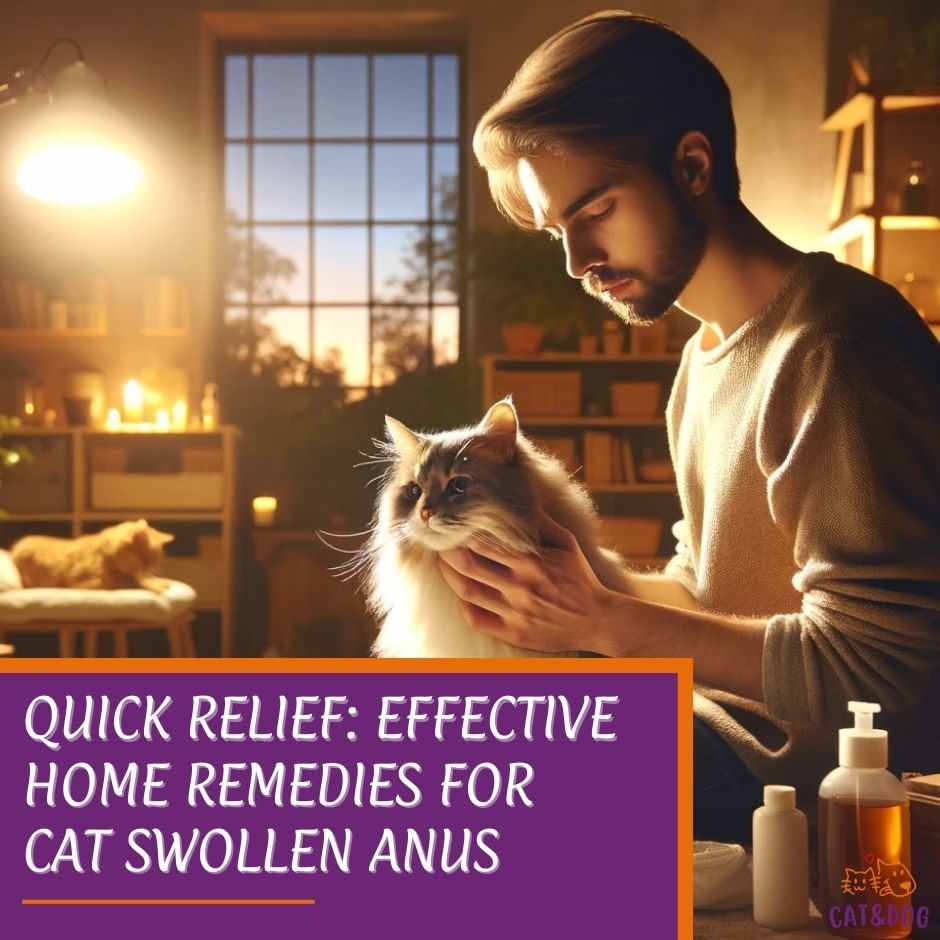What are some effective home remedies for cat swollen anus?
When your cat suddenly starts scooting across the carpet or frequently licking at their behind, it can be a sign of discomfort in a rather sensitive area—the anus.
Just like humans, cats can experience swelling in this area, known as a cat’s anus, which can be an indication of conditions ranging from mild, like minor irritations or allergies, to more serious, such as infections or even impactions.
Knowing a few handy home remedies might save the day, and more importantly, make your furry friend feel better.
Some symptoms of anal gland problems, such as scooting, licking, or biting at the hindquarters, and the presence of a lump or swelling near the base of the tail, should trigger an immediate trip to the vet, as it could be a sign of an infected anal gland. (1)
Remember though, while it’s okay to provide some relief at home, it is important to seek professional help for proper diagnosis and treatment.

Since you’re reading this, you’re probably looking for ways to ease your cat’s discomfort right at home, right?
Well, home remedies like warm compresses, Epsom salt baths, and increased dietary fiber or fiber supplements like Glandex can often provide relief for your kitty’s swollen behind.
Hydration is also key in maintaining a healthy digestive system and preventing straining, one of the culprits of anal swelling. (2)
Using anal gland supplements for cats can also help prevent anal gland issues from returning. However, if the anal sac disease is severe or recurring, surgical treatment may be necessary to lance the abscess.
Additionally, it is important to consider potential underlying causes such as food allergies, which can contribute to chronic anal sac issues in cats.
Now, you may be wondering how to tell when it’s time to escalate the care to a professional. Don’t worry, we’ll cover that too, along with preventive measures to keep your cat’s tail-end troubles at bay.
After all, you know that a healthy cat makes for a happy home—so let’s keep those tails up!
Key Takeaways
- Home remedies can provide relief for minor anal swelling in cats.
- It’s important to monitor your cat’s symptoms and seek veterinary care when necessary.
- Maintaining hydration and a high-fiber diet can prevent anal health issues.
Comprehensive Home Remedies for Cat Swollen Anus
Warm Compresses and Inflammation Soothing Techniques
Grab a clean cloth, dip it in warm (not hot!) water—think comfy bath temperature—and wring it out. Gently press the cloth against the sensitive anal area for a quiet moment, up to 5 minutes, a few times a day.
The warmth helps, but it’s your gentle touch that speaks volumes! Depending on the severity of the inflammation, a warm compress may be enough to provide relief for your feline friend.
Another option is to add some fiber to your cat’s diet, which can help prevent future infections by promoting healthy bowel movements.
Additionally, after expressing the anal sacs, they may be flushed with saline or an antiseptic solution to ensure proper cleansing and healing.
Staying informed about the latest cat health innovations can also play a crucial role in preventing issues like swollen anus, ensuring you’re using the most effective and safe methods to maintain your cat’s well-being.
Dietary Adjustments and Supplements
Spruce up their meals with a pinch of fiber, especially if they are experiencing diarrhea. Something like canned pumpkin (unsweetened, of course) can work wonders. (3)
Aim for easy-to-digest foods that are as gentle as your compress technique. And supplements?
A sprinkle of something with omega-3 fatty acids can help keep inflammation at bay, especially for cats with feline inflammatory bowel disease. Always chat with your vet before playing chef, though!
Natural and Herbal Remedies
Plants can pack a punch when it comes to health, and not just in your salad. Does your kitty need some natural TLC? Check this out:
- Aloe Vera: The goo inside this plant is like a cool breeze on a hot day, calming inflammation. (4)
- How to use: Apply a dab to the affected area, but prevent your cat from licking it off.
- Chamomile: Not just a sleepy-time tea, it’s also a gentle anti-inflammatory. (5)
- How to use: Cool chamomile tea bags can be placed on the sore spot after you’ve had your cuppa.
Remember, even Mother Nature’s remedies should be used with a vet’s nod. Your cat’s comfort and health are the top priorities, so while these home remedies can help, vet advice is always your best bet.
Cheers to their health and happy purring!
Natural Anti-Inflammatory Remedies
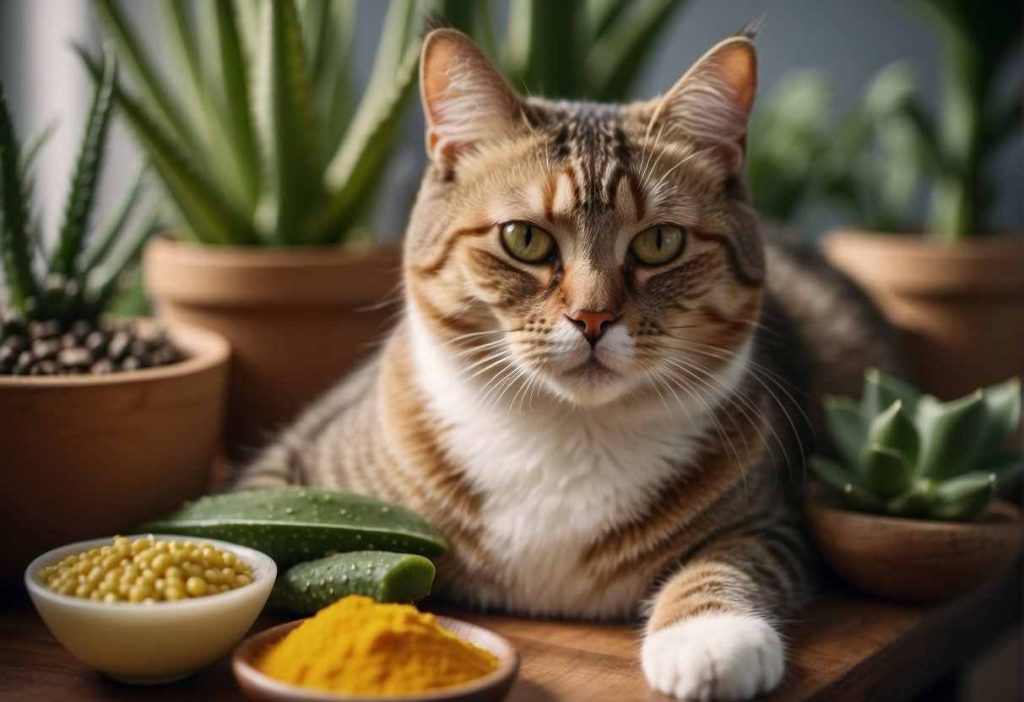
Well, you’re in the right place to find out what you can do to soothe your furry companion.
Warm Compresses
- What can they do? Reduce swelling and ease discomfort.
- How to use it? Simply apply a warm, damp cloth to the area gently.
Aloe Vera
- Why consider it? It’s a natural anti-inflammatory agent.
- How to apply? Dab a small amount of aloe vera gel on the swollen area with care.
Chamomile
- Benefits: Known for its soothing properties.
- Method: A cool chamomile tea bag can be gently placed on the affected area.
Caring for the tender area involves more than just applying remedies. You want to ensure you’re cleaning it gently but effectively.
So, how about some hypoallergenic wipes or a cotton ball dabbed in warm water to keep the area clean without causing further irritation?
And, what about trying these solutions regularly? Not only can it be comforting, but it can also help in maintaining routine health checks for your cat.
Remember to proceed with a soft touch and lots of love – always the best medicine in any cat care toolkit!
And if your cat experiences constipation which makes them have to strain hard, you can try giving them medicine for constipation.
Keeping things short and sweet, these natural interventions might just be the gentle helping hand your cat needs. Give them a try and observe how your cat responds.
If symptoms persist, a vet visit is the wise next step. Keep up the great care!
Identifying Symptoms of Swollen Anus in Cats
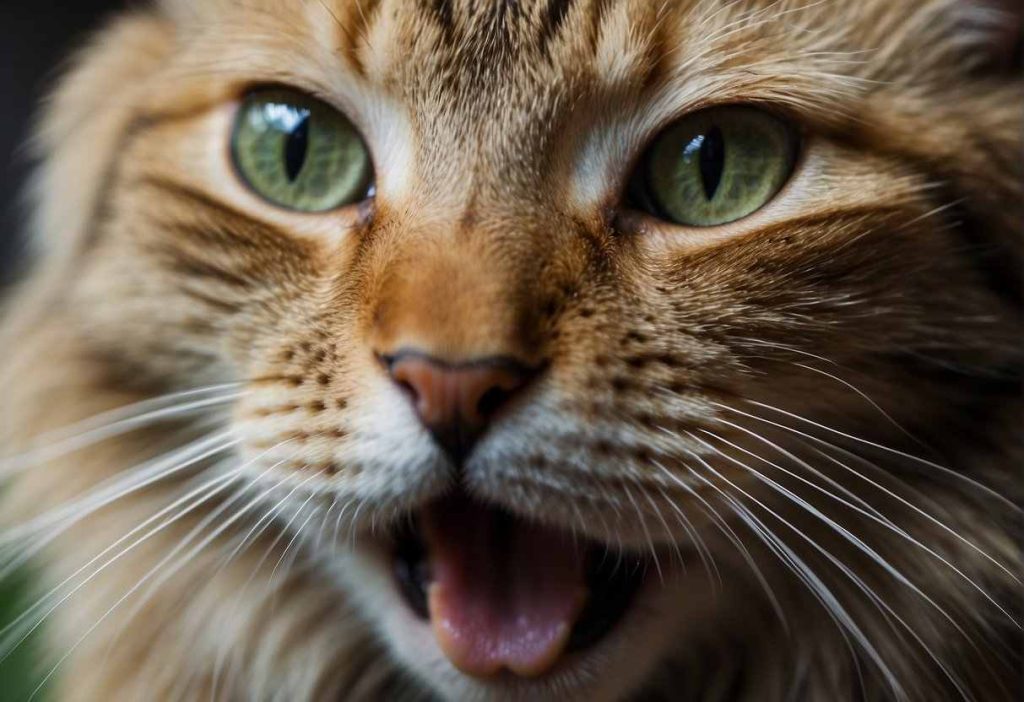
Recognizing the signs early can make a world of difference for your kitty’s comfort.
Recognizing Physical Signs: Keep an eye out for these visual cues: (6)
- Redness: Just like us, cats can get inflamed when there’s an issue. Look for any redness around the bum.
- Swelling: Any puffiness or enlargement in the area? That’s a red flag.
- Discharge: This could range from clear to pus-like fluid and is a sure sign something’s amiss.
Noticing Behavioral Changes: Your cat’s actions speak volumes:
- Excessive Licking: Cats are clean animals, but too much grooming back there? That’s a hint.
- Bathroom Habits: Struggling or changes in the litter box routine could point to discomfort.
| Symptom | What You Might Notice |
| Redness and Swelling | Visible signs of irritation |
| Discharge | Unusual fluid around the anus |
| Excessive Licking | Increased focus on cleaning the rear |
| Altered Bathroom Habits | Difficulty or changes in using the litter box |
Remember, while you play detective at home, seeking a professional opinion is always best. If your cat is showing these signs, consider a trip to the vet.
Early detection of cat health issues, such as a swollen anus, is crucial for prompt and effective treatment, ensuring your cat’s discomfort is alleviated as quickly as possible.
Itchy subject, I know, but your cat will thank you for your vigilance!
Cat Anal Gland Health

The anal glands are two small sacs located on either side of your cat’s anus at the 4 and 8 o’clock positions.
These glands secrete a substance used to mark territory and identify other cats—kind of a calling card during those backyard meet-and-greets.
The liquid produced by the anal glands is often deposited on the feces, making it a crucial part of your cat’s digestive and marking process.
However, if the glands become swollen or infected, it can cause discomfort and even lead to serious health issues.
That’s why it’s important to know how to properly care for your cat’s anal glands and recognize any potential problems with the ducts located just inside the side of the anus. (7)
Sometimes, however, things can go awry with these secretive sacs. Here’s a quick rundown on common hiccups in the world of cat anal health:
- Impaction: This is when the anal glands don’t empty properly. It’s like a traffic jam right at the exit, and it can be pretty darn uncomfortable for your kitty.
- Infection: Think impaction with a nasty twist. Bacteria join the party, leading to swollen and sore glands.
Now, let’s talk about keeping your cat’s derrière healthy:
- Diet: A fiber-rich diet can help promote regularity and prevent glands from getting clogged.
- Hygiene: A cat’s rear needs to be spotless! Use a soft, damp cloth to keep the area tidy.
- Probiotics: These gut-friendly microbes can aid in digestion and keep the digestive tract running smoothly.
- Regular Checks: Keep an eye on your cat’s behavior—excessive licking or scooting could signal a problem.
- Grooming: Trim that fur around the bum to prevent unwanted mess and potential infections.
Remember, while these tips can help maintain your cat’s anal health, it’s always best to consult your vet if you notice anything unusual.
They’re the experts, after all. Keep it clean and carry on—your cat’s tail end will thank you!
When to Visit Vet
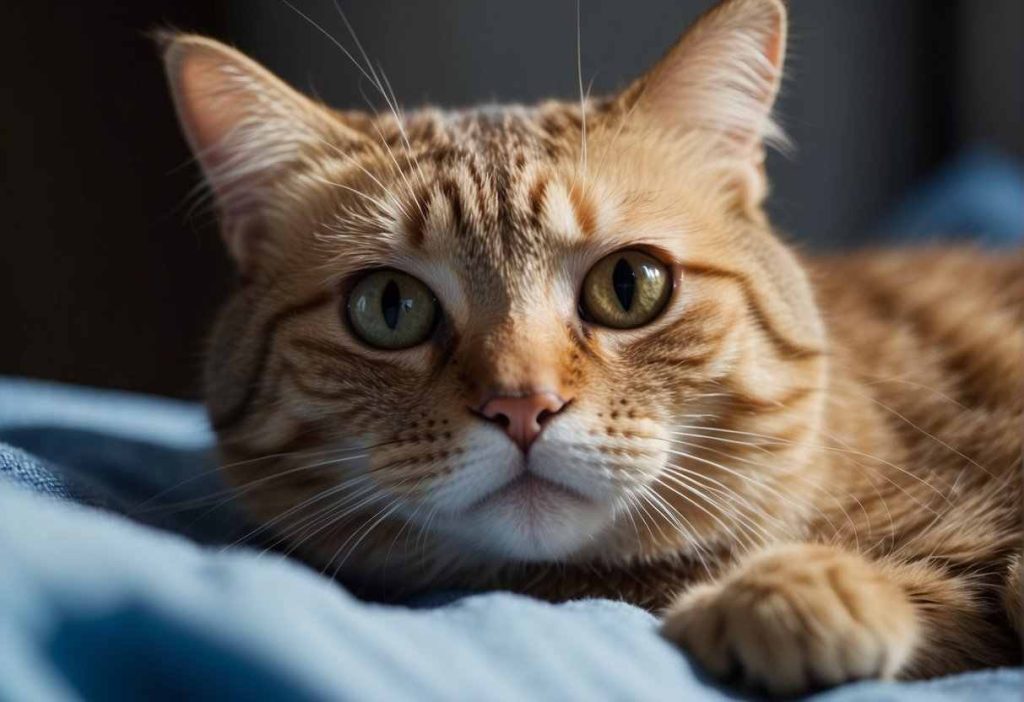
It might just seem like a minor nuisance, but sometimes these symptoms can be a red flag for something more serious. Let’s chat about when it’s time to put the home remedies aside and get your vet on speed dial.
Persistent Swelling or Discomfort: If your cat’s behind stays swollen for a few days, despite your best care, it’s time to take action.
Swelling that continues without improvement can be indicative of an underlying condition that needs professional treatment.
- Unusual Behavior: Cats are masters of disguise—hiding pain is their forte—so keep an eye out for any odd behaviors. Are they avoiding the litter box or seem antsy sitting down? These subtle cues are your cat’s SOS.
- Bleeding: Definitely not a sign to ignore. If you notice any bleeding from their anus, skip the home care and consult your vet pronto.
Once at the clinic, the vet might take a look at a few options:
- Antibiotics: Infections don’t stand a chance.
- Anti-inflammatory Medications: To reduce that pesky swelling and pain.
- Surgery: For those extreme cases, such as removing abscesses or tumors.
- Dietary Adjustments: Sometimes, it’s as simple as changing what they munch on.
So, keep this in mind: If home remedies like increased fiber or a warm bath aren’t cutting it, it’s not defeat to seek help—it’s just smart pet parenting.
Your vet’s got the gadgets, the know-how, and the treatment plans to get your kitty’s tail wagging again in no time!
Preventative Measures for Anal Health in Cats
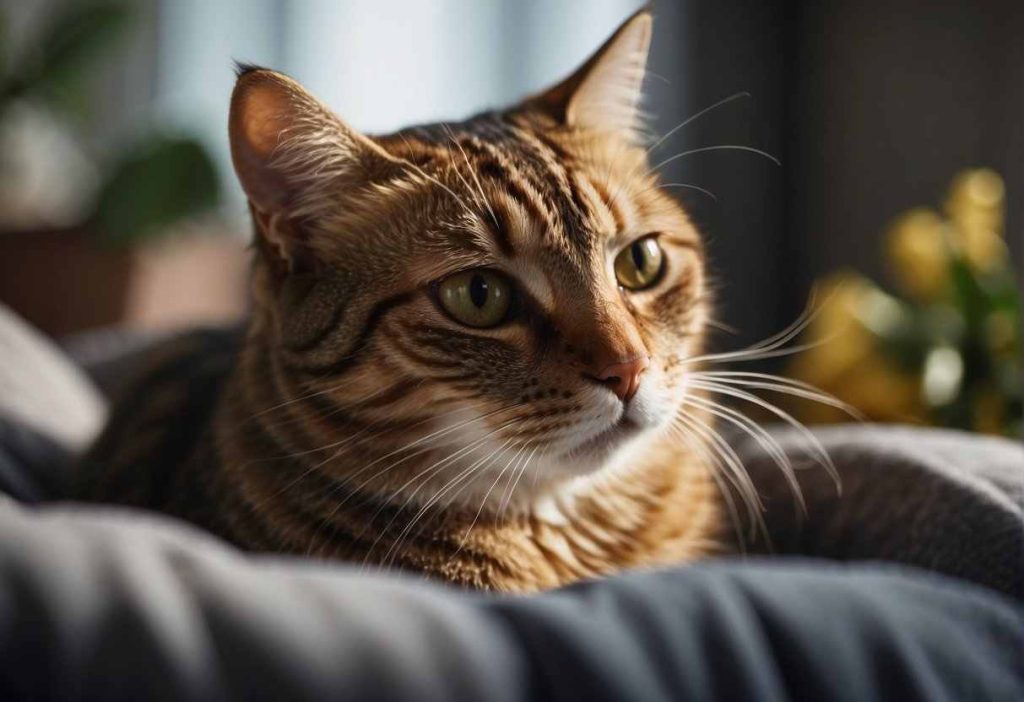
Diet and Nutrition for Anal Gland Health
What’s on the menu for your kitty can make a big difference. Balanced nutrition is key. Your cat’s diet should have the proper mix of fiber to help those anal glands do their job when nature calls.
- Make sure high-quality protein is on their plate.
- Incorporate fiber-rich foods to support digestion.
- Don’t skimp on hydration – a well-watered cat is a happy cat.
Consider this: a bit of pumpkin puree (not the spiced pie filling) can be a nice fiber boost for your cat.
Importance of Regular Exercise
Pounce into a routine! Exercise isn’t just for maintaining that sleek feline figure; it helps keep your cat’s anal glands in check too.
- Engage in daily playful activities.
- A game of chase or some string antics? Perfect.
- Regular movement promotes regular… well, movements.
Routine Veterinary Check-ups
We love a good DIY, but sometimes you need a pro. Regular vet visits are crucial for catching things early.
- Annual exams are a must – mark that calendar.
- Look out for signs of scooting or licking back there.
- Keep an open dialogue with your vet about any concerns.
Remember, you’ve got this. A few simple steps can keep your kitty’s tail wagging in all the right ways! Keep these tips handy and get ready to be your cat’s behind-the-scenes health hero.
Additional Resources and Community Support

Online Pet Health Platforms
Navigating the web for pet health advice can seem like a maze, can’t it? But don’t worry, a few trusted websites have got your back:
- The ASPCA (aspca.org) offers a wealth of knowledge on pet health, including issues related to your cat’s tushie troubles.
- PetMD (petmd.com) is like the WebMD for pets, providing vet-authored articles that can help you understand what’s going on with your kitty.
Engaging with Pet Owner Communities
Ever wanted to chat with other pet parents dealing with the same tail-end issues? Joining an online community can be like finding your new best friends who totally get what you’re going through:
- Reddit’s r/Pets provides a space to share experiences and get advice from fellow pet enthusiasts.
- TheCatSite.com has forums dedicated to cat health where you can swap stories and strategies.
| Platform | URL | Features |
| ASPCA | aspca.org | Health tips, community support |
| PetMD | petmd.com | Vet-authored articles, symptom checker |
| r/Pets | reddit.com/r/Pets | Discussion, advice, shared experiences |
| TheCatSite.com | thecatsite.com | Forums, cat health focus, community Q&A |
When jumping into forums, don’t be shy! Ask questions, provide your insights, and remember, you’re not alone in this.
Who knows, you might just find that golden nugget of advice that makes all the difference for your cat’s health.
Just keep in mind, that while these resources are valuable, they’re not a substitute for professional veterinary care. When in doubt, your vet should always be your go-to.
Quick Recap

Home Remedies for cat swollen anus:
- Warm Compresses: A simple press of a warm, damp cloth can soothe the swelling. Be delicate, and don’t press too hard!
- Coconut Oil: A dab will do! This natural anti-inflammatory can be applied sparingly around the area.
Other Tips:
- Considering an Epsom salt bath? It might help, as long as your cat tolerates baths without turning into a mini-tiger.
- Heard of apple cider vinegar? It has antibacterial properties, but it’s potent! A mild dilution might be beneficial.
Look Out For:
- Straining or difficulty in doing their business can be a tell-tale sign.
- Fresh blood in their stool? Time to phone the vet.
- Excessive grooming back there or attempting to slide across the carpet on their bottom? Not normal.
Keep an eagle eye on your cat’s healing journey. These remedies are for temporary relief, and it’s crucial to pivot to professional care if symptoms persist or worsen.
As a loving cat owner, your role is to ensure they get the right help when they need it. Caring for your cat’s health is a constant learning curve, filled with both purrs and perplexing moments. Happy healing!
Frequently Asked Questions
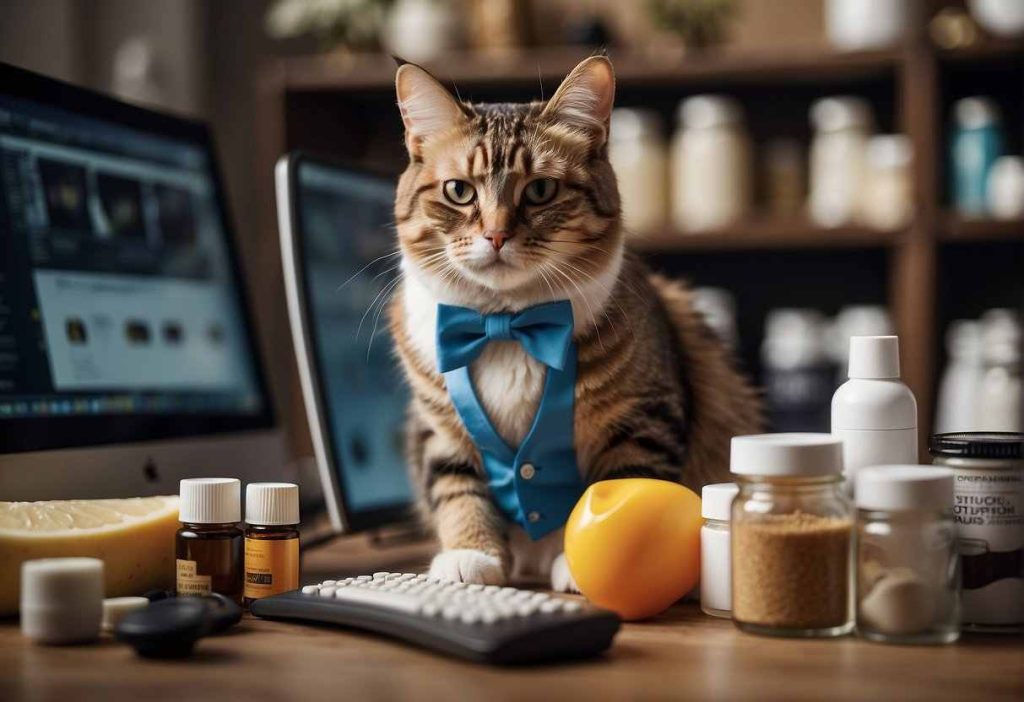
Facing a cat with a swollen anus can be worrying, but don’t fret—here you’ll find straightforward answers addressing your primary concerns.
What are the first signs of a swollen anus in cats that I should look out for?
You’ll want to keep an eye out for symptoms like excessive licking, visible redness, or swelling in the area around your cat’s anus.
Behavioral changes such as noticeable discomfort while sitting may also arise.
Can I use over-the-counter creams or ointments for my cat’s swollen anus?
It’s essential to consult your vet before applying any creams or ointments, as some products suitable for humans might not be safe for your furry pal.
How often should I apply warm compresses to my cat’s swollen anus?
Applying warm compresses 2-3 times a day can help soothe swelling and discomfort. Just ensure the compress isn’t too hot and that you apply it gently.
Are there any specific dietary changes I should make to help my cat with a swollen anus?
Avoid any abrupt dietary changes. However, providing a fiber-rich diet can promote digestion and may alleviate straining during bowel movements.
Consult your vet for tailored advice.
How can I prevent my cat from licking or biting the swollen area?
Distract your cat with toys or a cone collar if they can’t stop fussing over the affected area. Licking or biting can worsen the swelling and delay healing.
Is it safe to bathe my cat if it has a swollen anus?
Gentle cleaning with a damp cloth is preferable to bathing, which could irritate the sensitive area.
If a bath is necessary, be extra careful and use mild, cat-specific products.
What are the risks of not treating a cat’s swollen anus?
Neglecting treatment could lead to infections, prolonged discomfort, or more serious conditions. Therefore, it’s crucial to address the issue promptly with your vet’s help.

